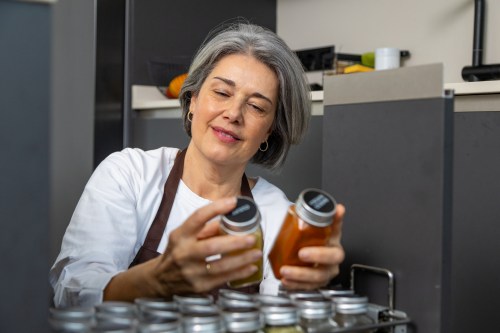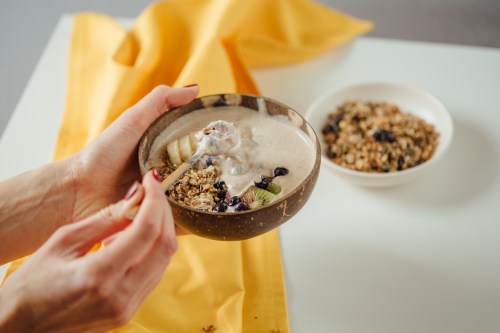This 1 Common Spice Might Interact With Your Meds, but That’s Not the Whole Story
Experts break down the findings of a new study that looks at the popular household spice.

If you keep up with the latest in medical and health news, you might have heard buzz about a recent study that found the spice cinnamon may mess with your body's ability to effectively use certain medications.1 If you're not necessarily a cinnamon fan, this may not apply to you, but if you frequently add the spice to your morning oatmeal, smoothies, or desserts, and you take one of meds in question, it's fair to have concerns.
Experts in This Article
medical toxicologist and co-medical director of the National Capital Poison Center
clinical pharmacist and associate professor at the Ernest Mario School of Pharmacy at Rutgers
Of course, headlines like “Beware This Popular Spice” or "Avoid This Spice if You Take Medications" are going to raise some red flags in your mind. But the reality is that this study's findings are a little more complicated than these concerning (and often overblown) headlines portray.
For the record, healthcare providers say you don't have to panic about these findings. However, some points within the study might be helpful to keep in mind if cinnamon is a staple in your pantry. Below, learn about the research on cinnamon and medication interactions, plus what pharmacists want you to know.
What did the study find?
The study, which was published in the journal Food Chemistry: Molecular Sciences, simulated the human digestive process to see how cinnamon affects drug metabolism (i.e., how the body breaks down medications into other chemical substances within the body called metabolites).2
From there, researchers introduced cinnamon oil, along with the spice's chemical components—cinnamaldehyde and cinnamic acid—to see how it affected this metabolizing process.3,4 It was discovered that cinnamaldehyde, in particular, activates receptors in the liver and intestines that control how the body breaks down medication. As a result, researchers concluded that having larger amounts of cinnamon in your system may lower the effectiveness of some drugs. (Cinnamon oil, however, did not have a significant impact on this process.)
This “could bring deleterious effects on human health, particularly in individuals with chronic health conditions,” researchers wrote in the study's conclusion.
But there are some big caveats to keep in mind
Most of the news surrounding this study suggests that any amount of cinnamon you ingest interferes with your body's ability to effectively use medications. But in reality, you don't need to worry about small portions, like the sprinkle you add to your morning coffee. And there are a few reasons for that.
For one, this study was an "in vitro study," which means it was conducted using test tubes or Petri dishes of cell samples. In other words, researchers didn't have a bunch of people on certain prescription medications eat cinnamon to determine a potentially harmful connection.
Since in vitro studies are considered early stages of medical research, it's difficult to take too much solid information away from their findings, says Jamie Alan, PhD, an associate professor of pharmacology and toxicology at Michigan State University. “In vitro studies tell us useful information, but they rarely tell the full story,” she says.
On top of that, the researchers only analyzed the effects of highly concentrated forms of cinnamon on medication metabolism, not the dashes you might enjoy here or there on your rice pudding or yogurt. And let's be real: you're not likely adding mounds of cinnamon to your meals.
All in all, the study authors wrote that "overconsumption" of cinnamon seems to be the potential issue here. While they didn't specify how much cinnamon is "too much" (i.e., how much will cause a negative interaction with certain medications), they did note that "controlled ingestion of cinnamon-containing foods" may be healthy. This means, "it is very likely that consumption of cinnamon in usual amounts will pose little to no risk," Dr. Alan adds.
Still, researchers are continually interested in the adverse reaction that cinnamaldehyde has on the breakdown of certain medications. Because of this, they plan to do a clinical trial soon to see if there are actual drug interactions between cinnamon itself and specific medications.
Why cinnamon might be problematic in higher doses
Theories that cinnamon interacts with certain medications have been around for a while. In fact, previous medical studies have found potential drug interactions with cinnamon, says Mary Wagner, PharmD, a clinical pharmacist and associate professor at the Ernest Mario School of Pharmacy.5
But Dr. Wagner notes that not every medication may be affected by cinnamon, and the amount matters. “We just don’t want people buying [cinnamon] supplements,” she adds, which often contain high doses of the spice.
One theory, in particular, is that "cinnamon may affect enzyme systems (i.e., proteins in the body) and other processes used by the human body to break down, detoxify, and eliminate medications, says Kelly Johnson-Arbor, MD, a toxicologist at MedStar Health.6 She adds that this is not surprising, considering "many other herbal products are also known to affect drug metabolism," like St. John's Wort, for example.
Dosage fuels many other theories, too. "Consumption of larger amounts of cinnamon may have more of an effect on drug metabolism than consumption of smaller amounts of the spice," Dr. Johnson-Arbor says. Meaning, regularly taking a cinnamon supplement, for example, which has a high potency, may have a greater effect than something like eating the occasional cinnamon-flavored cookie.
So, what do you do if you love cinnamon, but take meds regularly?
As we've learned, and as Dr. Johnson-Arbor mentions, the findings on cinnamon and medication interaction are preliminary right now. "Studies involving actual humans will be more helpful for determining the exact significance of this, including the exact dose of cinnamon needed to affect drug metabolism in humans," she adds.
So, if you're on a drug that's broken down through your liver, or a medication to prevent blood clots like Coumadin, Dr. Wagner recommends talking to your healthcare provider or pharmacist about potential drug interactions, plus reducing the amount of cinnamon you eat overall.
"Unless a drug has a narrow therapeutic window, most drug interactions are minor and can be managed by dose adjustments," Dr. Wagner says. Dr. Alan also says you can try spacing out when you take your medication from when you eat cinnamon. "If you are concerned, take your medication two hours before or two hours after eating cinnamon," she adds.
Ultimately, Dr. Johnson-Arbor recommends being aware of how much cinnamon you have if you take a medication regularly. “Cinnamon, along with other herbs, spices, and dietary supplements, may affect drug metabolism, although we are still learning the extent to which humans are affected by this,” she says.
“Until more information on this topic is available and more studies are completed, it’s important to tell your doctor about any over-the-counter medications, dietary supplements, or herbal products that you use, as these may interact with other prescription medications,” Dr. Johnson-Arbor adds.
- Husain, Islam, et al. “Evaluation of bioaccessibility, metabolic clearance and interaction with xenobiotic receptors (PXR and ahr) of Cinnamaldehyde.” Food Chemistry: Molecular Sciences, vol. 10, June 2025, p. 100237, https://doi.org/10.1016/j.fochms.2024.100237.
↩︎ - Susa ST, Hussain A, Preuss CV. Drug Metabolism. [Updated 2023 Aug 17]. In: StatPearls [Internet]. Treasure Island (FL): StatPearls Publishing; 2025 Jan-. Available from: https://www.ncbi.nlm.nih.gov/books/NBK442023/ ↩︎
- National Center for Biotechnology Information. "PubChem Compound Summary for CID 637511, Cinnamaldehyde" PubChem, https://pubchem.ncbi.nlm.nih.gov/compound/Cinnamaldehyde. Accessed 5 May, 2025. ↩︎
- National Center for Biotechnology Information. "PubChem Compound Summary for CID 444539, Cinnamic Acid" PubChem, https://pubchem.ncbi.nlm.nih.gov/compound/Cinnamic-Acid. Accessed 5 May, 2025. ↩︎
- Espiritu, Michael J et al. “Mechanisms of Herb-Drug Interactions Involving Cinnamon and CYP2A6: Focus on Time-Dependent Inhibition by Cinnamaldehyde and 2-Methoxycinnamaldehyde.” Drug metabolism and disposition: the biological fate of chemicals vol. 48,10 (2020): 1028-1043. doi:10.1124/dmd.120.000087 ↩︎
- Lewis T, Stone WL. Biochemistry, Proteins Enzymes. [Updated 2023 Apr 24]. In: StatPearls [Internet]. Treasure Island (FL): StatPearls Publishing; 2025 Jan-. Available from: https://www.ncbi.nlm.nih.gov/books/NBK554481/ ↩︎










